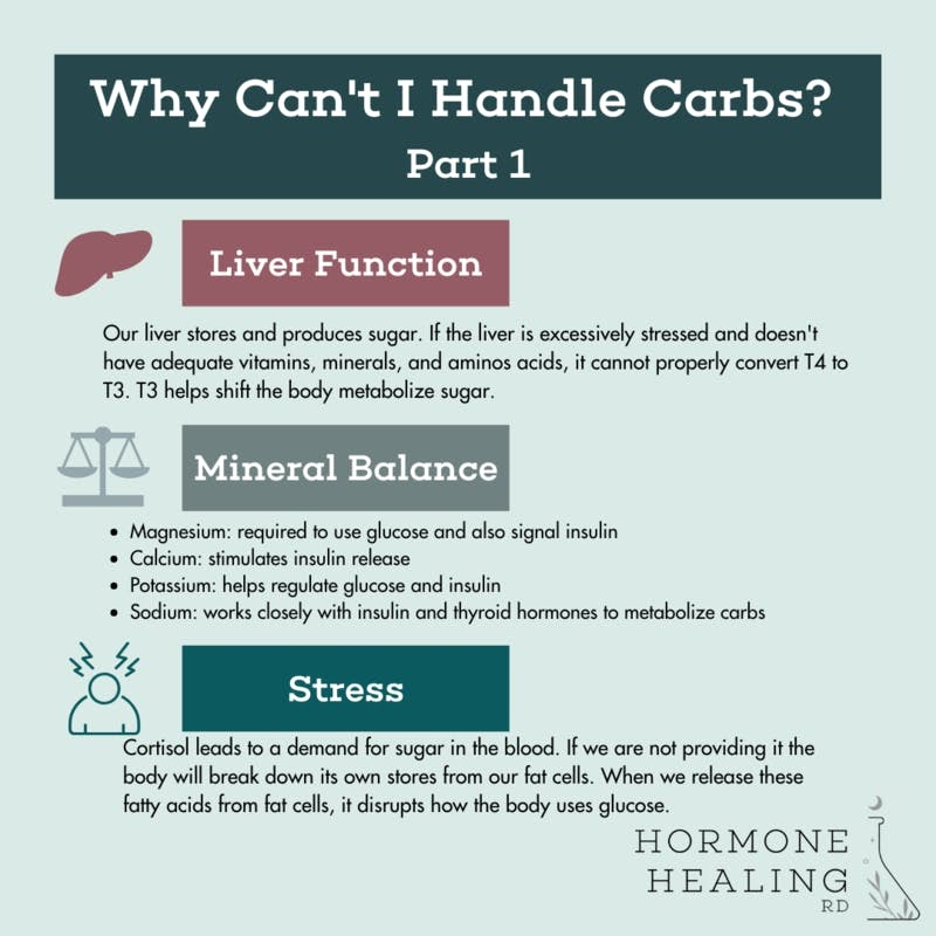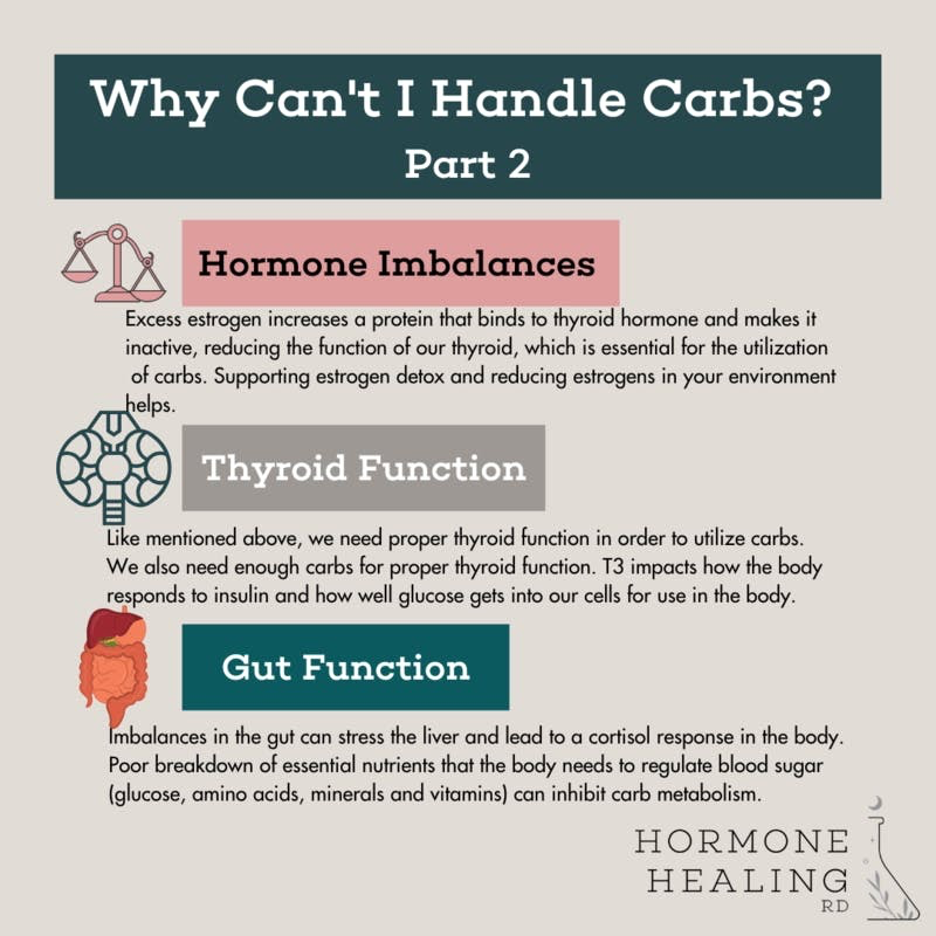I’ve pretty much tried every diet out there, as I’m sure you can relate. Most diets lead with carb restriction. When I first found Paleo, and then went on to participate in two research studies at the University of Connecticut as part of my Dietetics program, I became hyper-aware of one macronutrient group in specific, carbohydrates. Several factors can impact how the body uses carbs, leading many women to believe that they can’t “tolerate” them.
Why the bad rep?
I’ll be honest; I’m pretty sad that carbs are so demonized, especially regarding women’s health. It also saddens me to think that I restricted them for so long because I thought it was the only way to be healthy/lose weight/maintain a healthy weight. In reality, carbohydrates are the primary energy source that our bodies use to get our cells’ energy. We store carbohydrates in the body as glucose that we can access for energy when needed (pending we don’t have health issues preventing this). Still, when it comes to our brains, they need a continuous supply of carbohydrates to function correctly.
However, our brains do not store carbohydrates; instead, they use up about 120g of carbs daily. This fact alone was enough to get me to wake up and realize that maybe limiting carbs wasn’t the best option for my long-term health. Not to mention the importance of carbs for thyroid function and hormone balance. But what if you feel like you gain weight just looking at carbs? Then that’s a sign something deeper is going on.
What is stopping my body from processing carbs properly?
Often, women object when I discuss the importance of eating more carbs and removing fears around carbs. The most common feedback I hear is that they are apprehensive about adding carbs into their diet for fear it will make them gain weight. Some even claim that they gain weight just by looking at a cookie. So why is this? Let’s go through the six main areas that can impact this.
1. Liver Function- Our liver keeps blood sugar levels stable along with a million other functions (like sending protein to areas that need it, processing hormones, converting cholesterol, and storing vitamins & minerals). It also influences thyroid hormone conversion, which allows us to metabolize carbs for energy in the body.
2. Mineral Balance- Magnesium and calcium, along with B vitamins and potassium, affect insulin signaling in the body. Having imbalances and deficiencies can make the processing of carbs difficult.
3. Stress- Any stress will increase the demand for sugar in the body. Whether it’s a physical stressor, emotional stressor, undereating, inadequate sleep, relationship stress, etc., when we don’t give the body sugar in response to the stress, our bodies still need this energy from somewhere, so they tap into our fat stores and use fatty acids. The use of fatty acids disrupts how we use glucose.

4. Hormone Imbalances- Excess estrogen is the main culprit. When we have excessive estrogen levels, our body makes a protein that binds to it, which causes it to become inactive. Our body does this to keep us safe. Doesn’t sound so bad, right? The issue is that this protein binds to the thyroid hormone, which we need for SO many different functions in the body. Without adequate thyroid hormone, we don’t process carbs the same way. This is why excess estrogen can negatively impact how we process carbs. This is also often seen with hormonal birth control and is how it affects insulin resistance.
5. Thyroid Function- like I mentioned above, we need proper thyroid function to utilize carbs. We also need enough carbs for adequate thyroid function, which can make this specific area tricky. T3 (the active form of thyroid hormone) impacts how your body responds to insulin. It’s also harder to get glucose into the cells if we don’t have adequate thyroid hormone levels. It’s important to keep in mind that if the thyroid slows down, so does the liver, impacting estrogen levels and carb utilization. Can you see how everything is connected?
6. Gut Health- The gut impacts the body on so many levels, but two specific ones that come to mind with carbs are:

How can I support the utilization of energy in my body?
What it comes down to when we don’t utilize essential nutrients, like carbohydrates well, is that there is an area of the body that likely needs support. While we could dive deep into each of the six areas outlined above, I think it would be most helpful to talk about supporting the liver, nutrients to consider, stress, and gut function. These will influence the rest.
Supporting the Liver: The liver is essential for proper digestion, conversion of thyroid hormone, processing hormones like estrogen, and so much more. It also stores carbohydrates to release when our blood sugar drops too low. Since it is so important, we will start with that. Below are the most basic but helpful ways to support the liver:
Supporting Digestion: Make sure you are doing all of the above since the liver directly impacts how we breakdown food, then:
Reducing Stress: When we have high cortisol levels, we increase the demand for sugar from the body. If we are not giving it to the body, we will make it from fatty acids. This then makes using sugar as energy, more difficult. Having even a small amount of carbs in meals and snacks from whole foods can help improve this.
Nutrients To Emphasize: Certain nutrients are required to help us breakdown and process carbohydrates, support proper liver function, and create thyroid hormone. Including foods that contain these regularly can be helpful.
You will notice the six areas, which explain how our bodies utilize carbs, all interact with each other. My goal was to show you that we need carbs, and restricting them isn’t always the answer, especially when it comes to hormone health. If you are like I was, and fear carbohydrates, or feel like your body doesn’t respond well to them, your body has sent you an important signal. We are continually getting warnings from our bodies via temperature, pulse, mood, energy level, hunger, fullness, digestion, etc. You could quickly start googling all of your symptoms and try to make sense of them, but I recommend avoiding that. Instead, make notes. Start collecting data on yourself and learn from your body. Build a unique connection to yourself mentally and physically to help you feel your best. No one knows your body like you do. If you are intrigued by this topic and want to learn how to better support your hormones through a personalized approach to nutrition, smart supplementation, and mineral balance—check out my Master Your Minerals course, in which you’ll learn how to interpret your own HTMA and build a hormone-healing protocol based on your unique results.
Photo by Gardie Design & Social Media Marketing on Unsplash
